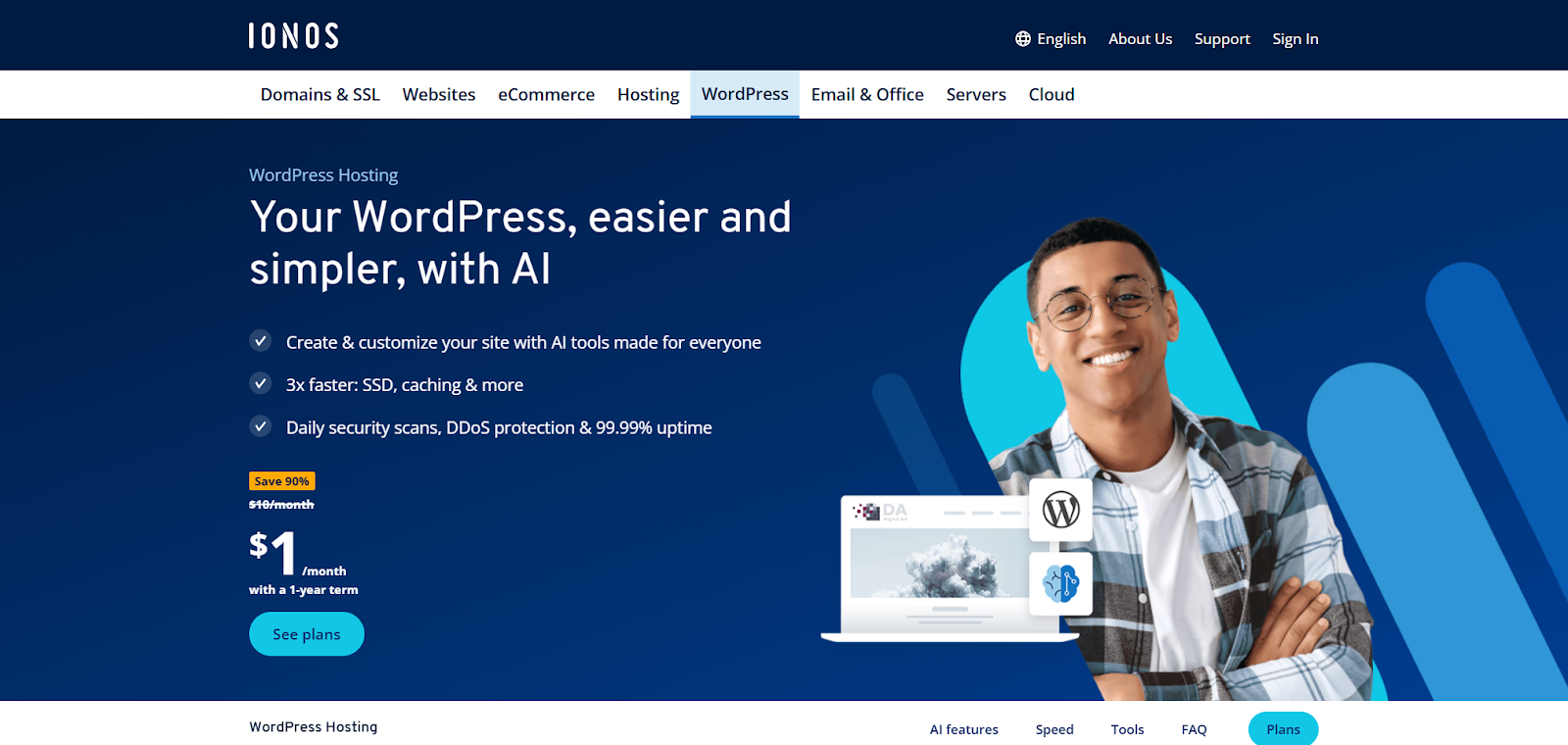Table of Contents
Choosing the right web hosting provider is a vital step for any successful website. It affects your site’s speed, security, reliability, and how easily you manage everything. With countless options available, how do you select the best fit? This is especially true if you build with WordPress and potentially Elementor.
This guide examines three popular choices for 2026: Bluehost, IONOS, and Elementor Hosting. We will explore what each offers to help you decide wisely.
Bluehost vs IONOS vs Elementor Hosting in 2026
Elementor Hosting: All-in-One Solution for WordPress Websites
Elementor Hosting presents itself differently. It is more than just hosting; it is a complete managed platform created specifically for building and running websites with Elementor.
Think of it like a tailored suit compared to one off the rack. Because Elementor manages both the builder and the hosting, they can optimize everything to work together perfectly. It operates on the Google Cloud Platform, known for its dependability and speed. You also receive advanced NVMe SSD storage. This storage is much faster than traditional SSDs, leading to quicker website load times.
Key advantages include:
- Bundled Elementor Core: You receive the essential Elementor building tools integrated from the beginning. (Note: While past plans included Elementor Pro, current plans emphasize Elementor Core integration.)
- Managed WordPress Environment: WordPress is pre-installed. Many technical tasks like core updates and security are handled for you.
- Integrated Security: Features like a free SSL certificate, Cloudflare CDN (often the premium Enterprise level), automatic daily backups, and proactive security monitoring are included.
- Performance Optimization: Built-in caching and the strong Google Cloud infrastructure help ensure your site performs quickly.
- Staging Environment: Most plans offer a one-click staging site. This allows you to test changes or updates securely before applying them to your live site.
- Premium Support: You get access to a support team experienced in both hosting and Elementor.
Who is it Best For?
Elementor Hosting excels for web creators, agencies, and businesses that value a smooth workflow. It suits those wanting hosting perfectly matched with their Elementor page builder. If you appreciate ease of use, top performance infrastructure (Google Cloud, NVMe), and having security and backups managed within the Elementor system, it is a strong option. The slightly higher starting cost reflects its managed nature and bundled premium features.
Bluehost: A Popular Entry Point

Bluehost stands as one of the most recognized names in web hosting. It is particularly popular among WordPress beginners and is officially recommended by WordPress.org.
Its main appeal traditionally comes from affordability (especially introductory deals) and ease of use. Bluehost usually includes the familiar cPanel control panel. Many users find cPanel simple for managing files, databases, and email accounts.
Key features include:
- Low Introductory Pricing: Their shared WordPress plans often begin at some of the lowest available prices for the first term.
- Free Domain & SSL: Like many competitors, they typically offer a free domain name for the first year and a free SSL certificate.
- WordPress Focused: They provide specific WordPress hosting plans featuring automatic WordPress installation and updates.
- Variety of Plans: Bluehost offers shared hosting, VPS, and dedicated server options, enabling future growth.
- 24/7 Support: They provide round-the-clock support through chat and phone.
Who is it Best For?
Bluehost often serves as a solid start for personal bloggers, small informational websites, or newcomers to WordPress seeking a low initial cost and a standard hosting experience with cPanel.
IONOS: The Budget-Focused Contender

IONOS (previously 1&1 IONOS) competes strongly on price. They often feature extremely low introductory rates, sometimes just $1 per month for the first year on select plans.
They provide a broad range of services beyond basic web hosting, including VPS, dedicated servers, and even Windows hosting choices.
Key characteristics of IONOS are:
- Aggressive Introductory Pricing: Often the least expensive way to begin for the first payment term.
- Generous Features on Higher Tiers: Some plans include unlimited websites or storage, which can be appealing.
- Performance Tools: Features like caching and SSD storage are usually part of the package. Some plans now feature AI tools for website creation.
- Custom Dashboard: While offering traditional control panel access for certain services, their main interface is often a custom dashboard. This might feel different from the standard cPanel experience.
- Global Presence: They manage data centers across several countries.
Who is it Best For?
IONOS strongly attracts users whose main goal is the absolute lowest cost for the initial hosting period. Small businesses or individuals seeking very cheap entry-level hosting, or those requiring specific products like Windows hosting, might find IONOS appropriate.
Selecting the Best Hosting Plan for You
Choosing correctly involves more than picking the cheapest or most feature-rich option. It requires matching the hosting to your unique needs. Think about these elements:
- Hosting Tuned for WordPress/WooCommerce: Does the host specialize in WordPress? Seek features like automatic updates, WP-CLI access, server caching optimized for WordPress, and knowledgeable support. For online stores, specific WooCommerce hosting features offer advantages. Elementor Hosting is naturally tuned for WordPress since Elementor is a WordPress plugin.
- Define Your Website’s Hosting Needs: What kind of site are you running – a simple blog, a complex business site, or an e-commerce store? Estimate your traffic, storage requirements, and necessary features (e.g., email accounts, staging sites).
- Planning Hosting for Future Site Growth: Select a provider that allows easy scaling of resources (CPU, RAM, storage) as your traffic and website complexity grow. Managed solutions like Elementor Hosting often handle scaling more smoothly.
- Managing Your Web Hosting Budget Wisely: Consider both the introductory price and the renewal rate. Sometimes, paying slightly more initially for a managed solution saves time and effort later.
- Why Hosting Reliability & Uptime Matter: Target hosts with a solid uptime guarantee (99.9% or better). Downtime translates to lost visitors and potential income. Providers using strong infrastructure like Google Cloud (used by Elementor Hosting) often deliver excellent reliability.
- Faster Speeds with NVMe Server Storage: NVMe (Non-Volatile Memory Express) SSDs provide much faster read/write speeds than older SATA SSDs. This leads to faster website loading and improved backend performance. Elementor Hosting uses NVMe storage.
- The Value of 24/7 Expert Hosting Support: When issues arise, you need fast, expert help. Look for providers skilled in your platform (like WordPress and Elementor).
- Need for an Easy-to-Use Control Panel: Do you prefer the standard cPanel (common at Bluehost) or a more integrated, modern dashboard (like Elementor Hosting or IONOS’s custom panel)? Ease of use is subjective here.
Picking the right host means evaluating your current needs, future growth, budget (including renewals), and technical needs like speed (NVMe), reliability, and support. Prioritize hosts optimized for your platform (WordPress/Elementor).
Key Factors for Smooth Hosting Migration
Moving your website to a new host might seem intimidating, but planning simplifies it.
- Understanding Data Transfer: This includes copying your website files (themes, plugins, images) and your database. Many hosts offer migration tools or assistance.
- Handling Your Domain Name: You must update your domain’s DNS (Domain Name System) settings to point to the new host’s servers. This change, called propagation, can take anywhere from a few hours to 48 hours.
- Choosing Where to Host Your Emails: Decide whether to keep email with your domain registrar, move it to the new host, or use a separate service like Google Workspace or Microsoft 365.
- Tips to Prevent Downtime: Upload and test your site thoroughly on the new host before changing the DNS. Plan the DNS update during a period of low website traffic.
- Using Simple One-Click Migration Tools: Numerous WordPress migration plugins (like Duplicator or All-in-One WP Migration) or tools provided by hosts can streamline the move. Elementor Hosting often offers tools or support for migrations.
A successful move requires careful planning for data transfer, DNS updates, and email hosting. Use available tools and test completely on the new server before the final switch to limit downtime.
Boosting Site Performance on New Hosting
Just moving to a new host does not guarantee maximum speed. Optimization is still key.
- Actionable Performance Tuning Tactics: Optimize images, minify CSS/JavaScript files, use browser caching effectively, and keep the number of plugins lean.
- Using Caching & CDN for Faster Loading: Confirm server-level caching is active on your new host. A Content Delivery Network (CDN) stores copies of your site closer to visitors worldwide, accelerating delivery. Elementor Hosting features integrated caching and Cloudflare CDN.
- Gains from Cloud Infrastructure Hosting: Hosting on cloud platforms like Google Cloud (which Elementor Hosting uses) typically offers better scalability and resource management than traditional shared hosting.
- Essential Regular Maintenance Routines: Keep the WordPress core, themes, and plugins up-to-date. Regularly clean your database and delete unused themes or plugins.
Utilize your new host’s performance tools like caching and CDN. Maintain best practices such as image optimization and regular updates for continued speed. Cloud infrastructure can provide performance benefits.
Essential Web Hosting Security Measures
Website security is crucial. Your host plays a significant role, but you also share responsibility.
- Securing Your Site with SSL and HTTPS: This is vital for encrypting data between your site and visitors. Most reputable hosts (including Bluehost, IONOS, and Elementor Hosting) offer free SSL certificates.
- Setting Up Your Hosting Firewall Rules: A Web Application Firewall (WAF) helps block malicious traffic before it hits your site. Many managed hosts provide this.
- Performing Regular Security Checks: Employ security plugins or services to scan for malware and potential weaknesses.
- Backup Strategies & Disaster Recovery: Ensure regular, automatic backups occur (daily is best) and know how to restore them if needed. Elementor Hosting includes automated daily backups.
- WAF, DDoS & BotNet Defense Explained: Your host should offer protection against common threats like Distributed Denial of Service (DDoS) attacks and harmful bot traffic.
- Adding Multi-Factor Auth Security: Implement MFA for your hosting account and WordPress admin login for extra security.
- Importance of 24/7 Security Monitoring: Good hosting providers monitor their network for threats constantly.
- Keeping Software Safe with Auto Updates: Enable automatic updates for WordPress core, plugins, and themes where possible, or follow a strict manual update schedule.
- Secure Database & File Transfer Access: Use strong, unique passwords and secure connections (like SFTP instead of FTP).
- Automatic Security Patch Management: Managed hosting frequently includes automatic patching for server-level security issues.
- Using Dev/Stage/Prod Environments Safely: Test all updates and changes in a staging environment before applying them to your live production site. Elementor Hosting provides easy one-click staging.
Security involves teamwork. Use your host’s built-in security (SSL, WAF, monitoring, backups) and adhere to best practices like strong passwords, MFA, regular updates, and security scanning.
What’s Next for the Web Hosting Industry
The hosting landscape continually changes. Here are several trends worth noting:
- New & Upcoming Hosting Technologies: Anticipate progress in server hardware, edge computing (processing data nearer the user), and serverless designs.
- Eco-Friendly Sustainable Data Centers: There is growing interest in “green hosting” solutions powered by renewable energy.
- AI & Automation in Hosting Management: Artificial intelligence is increasingly used for predicting maintenance needs, automatically adjusting resources, detecting security threats, and even assisting customer support.
- Rise of Green Energy Hosting Servers: More providers are prioritizing energy efficiency and utilizing renewable power sources for their operations.
The future of hosting suggests faster, smarter, and more sustainable options, with AI becoming more prominent in management and optimization.
Conclusion: Making the Right Choice For You
Deciding between Bluehost, IONOS, and Elementor Hosting in 2026 ultimately hinges on your specific priorities.
- If you are a beginner with a limited budget needing a standard WordPress site, Bluehost’s low initial cost and familiar cPanel are attractive. Just be prepared for higher renewal costs.
- If extremely low introductory pricing is your main focus, IONOS provides some of the cheapest starting terms available. However, renewal prices align more closely with competitors, and the user interface might feel different.
- If you are an Elementor user looking for a premium, integrated, and managed experience with top infrastructure (Google Cloud, NVMe), built-in security, performance features (CDN, caching), bundled Elementor Core tools, and expert support tailored to the Elementor ecosystem, then Elementor Hosting offers a powerful, efficient solution that justifies the investment.
In the end, the “best” host is the one that reliably supports your website’s objectives, aligns with your long-term budget, and simplifies site management for you. Carefully weigh the features, performance, support, and complete pricing (both introductory and renewal) of each provider against your unique requirements before choosing.
Looking for fresh content?
By entering your email, you agree to receive Elementor emails, including marketing emails,
and agree to our Terms & Conditions and Privacy Policy.





